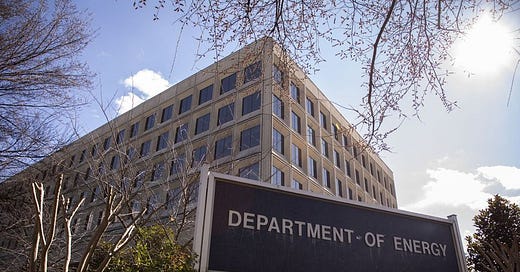Funding Science on the Basis of Identity
Forget the Higgs boson and neutrinos. The Energy Department wants to know your diversity plan.
At the end of October, I published the following essay in the Wall St. Journal. The essay was located behind the WSJ paywall, but after 30 days, authors have permission to reprint the article elsewhere. I am therefore reprinting it here, for all readers…
America’s largest research funder in physical sciences isn’t the National Aeronautics and Space Administration or the National Science Foundation. It’s the Energy Department’s Office of Science, which gives money to university programs throughout the country and oversees the 10 major national laboratories, from Livermore to Los Alamos.
Its brief includes energy and research into fundamental questions: the structure of matter, the nature of the cosmos, high-energy and nuclear physics with large accelerators, materials physics with X-ray synchrotrons, fusion and advanced scientific computers. And now, social justice.
Starting in fiscal 2023, which began Oct. 1, every proposal responding to a solicitation from the Office of Science is required to include a PIER plan, which stands for Promoting Inclusive and Equitable Research, to “describe the activities and strategies of the applicant to promote equity and inclusion as an intrinsic element to advancing scientific excellence.” In the words of the announcement, “The complexity and detail of a PIER Plan is expected to increase with the size of the research team and the number of personnel to be supported.”
When I read this new requirement, I went back to the last grant proposal from our group—which involved exploring gravitational waves, the early universe, Higgs boson physics, neutrino cosmology, dark-matter detection, supersymmetry and black-hole physics. What does any of this have to do with diversity and inclusion? Nothing.
Scientists will respond to these new demands with boilerplate to the effect that they will make every effort to seek graduate and postdoctoral students from minority communities and encourage new outreach programs. This is lip service at best; it doesn’t address true societal issues of inequity. People qualified to work in these esoteric areas have all gone to good graduate schools and carried out credible research projects. They may be minorities, but they haven’t been marginalized. They are thus not appropriate targets for what should be useful societal diversity initiatives.
The extensive DEI bureaucracy at universities has already worked for decades to ensure that no STEM job announcements or hiring can be done without constant supervision to ensure that women and minorities are recruited. But given the strong wording of the new guidelines, existing programs may not be enough. This is worrisome, as university DEI boards have shown a willingness to torpedo job applications whose DEI component is insufficiently extensive or effusive. The new Energy Department review committees probably won’t behave differently.
Are we at a point where the heart of the nation’s scientific research enterprise is to be held hostage to ideology? Will the U.S. government refuse to fund major national-laboratory initiatives to explore forefront fundamental and applied science because scientists show insufficient zeal for fashionable causes?
Besides skewing scientific priorities, this represents an inappropriate skewing of national priorities. There are serious societal inequities, but they run much deeper and include lack of support for K-12 education, safe housing and child care in inner cities, among other things. Attempting to jerry-rig participation at the highest echelons of science is a waste of time and money.
Scientists, meanwhile, already have precious little time to devote to pure research among the many other demands on their time. Writing grant proposals to support research is an onerous activity, even when they focus on the science.
And the new initiative doesn’t stop with research. Professional conferences bring scientists together to discuss important science issues. No longer. Now conference organizers will have to spend the bulk of their effort meeting bureaucratic requirements on diversity and “conduct.”
“Beginning in FY 2023,” the announcement states, “proposals requesting funding to support a conference will require that the host organization of the conference have an established code of conduct or policy in place that addresses discrimination, harassment, bullying, and other exclusionary practices. . . . Applicants will also be required to submit a recruitment and accessibility plan for speakers and attendees. This plan will need to include discussion of the recruitment of individuals from groups historically minoritized in the research community.” I’ve served on numerous national-conference organizing committees over the years, and attendees at these conferences never raised the issue of discrimination, harassment, bullying or exclusionary practices.
All these new burdens will diminish the integrity and strength of the scientific enterprise in the U.S. In May 2021, when President Biden nominated Asmeret Asefaw Berhe to lead the Office of Science, I wrote in these pages that she didn’t seem an appropriate person to lead the office. Her work as a soil biochemist wasn’t related to any of the office’s major physical-science programs, and she had no experience as a scientific administrator and little experience with the Energy Department itself. She did, however, have extensive experience working on diversity issues.





I'm so happy that I'm and old man . The young men today do not stand a chance in the "WOKE" world.
I wonder what this will get me banned from???
You write, "Are we at a point where the heart of the nation’s scientific research enterprise is to be held hostage to ideology?"
Well, all human activity is held hostage to ideology of some kind or another. The scientific enterprise seems built upon the typically unexamined assumption that more knowledge is always better. That's an ideology too. And just as the assumptions of woke culture are reasonably challenged, so are the assumptions of science culture.
It's not really a conflict between science and ideology, but rather a conflict between two competing ideologies.